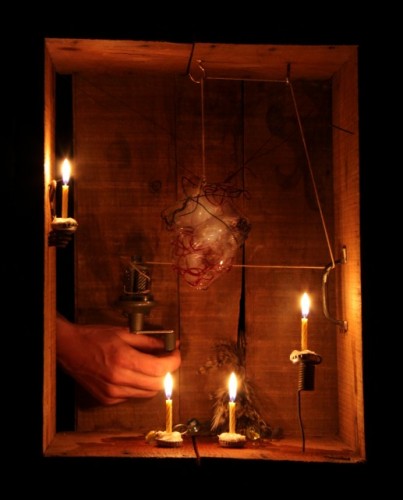The Gypsy Awards, 2013 Edition
Seattle Theater Writers announced their slate of nominees for the second annual Gypsy Rose Lee Awards today.
Seattle's journal of culture and politics.
Seattle's journal of culture and politics.
Seattle Theater Writers announced their slate of nominees for the second annual Gypsy Rose Lee Awards today.
Here, as the magician clearly shows his tricks, the purpose is to prevent the audience from simply falling in love with effects by making the audience pay attention to their cumulative structure. Not “How’d he do that?” but rather, “What will he do next?”
The Star’s Kelly Dermody recently interviewed The Habit’s Luke Thayer, Jeff Schell and Mark Siano and talked about their creation process, the group’s temporary sojourn to Los Angeles, and what their future is going to look like.
John Guare’s plays were po-mo before po-mo was the American theater’s default setting. They revel in pop culture references. They erase the line between reality and the phony “hyperreality” promoted every day in the media. His approach to the material is that so beloved of deconstructionists everywhere: pastiche. The difficulty in staging this pastiche is that the play often threatens to turn into pure chaos.
The desire to be somewhere better is indigenous to the human race. There are probably at least a myriad of clichés about how “the grass is greener” and it is certainly common to wish one were somewhere else. When life is relatively stable, this desire to find greener pastures is a luxury. When life is chaos, this desire is no longer a luxury but a thirst for life.
In our post-Bush era, political theater is increasingly rare. In our remote, cozy and often smug city of Seattle it is rarer still. Anything encouraging Americans to get together in a group to solve problems is a general anathema. Stereotypes have hardened. Dialogue is emotional and without sense. Issues are treated not as matters to solve by consensus but rather to be solved by fiat. It is no wonder discussion feels polarized.
Caryl Churchill is renown for not talking about the meaning of her plays in public. A positive result of this reticence is that her plays retain their complexity as works of art. A negative result is that there is a lot of pure rubbish written about them.
It refreshes the soul to go out once in awhile and watch students who still love, still care, still dream about making good work. But it is not only a pleasure to watch the students grow and take chances but also a pleasure to watch their teachers do work they would not otherwise get to do.
Cole Hornaday visits with the fiery ball of energy that is Yana Kesala, and talks with her about her upcoming work and what it means to be a Ukrainian dentist’s daughter.
Mr. Smith’s handling of the circular narrative is quite refreshing and refuses to become yet another simple story that gives easy answers. The ending even calls into question the entire evening’s storytelling itself. It is a substantial and enjoyable script, aided by six extremely good actors. Matthew Aguayo, Carter Rodriquez, Heather Persinger, Susanna Burney, Chris MacDonald and Sara Peterson give the production their all.
Notifications









